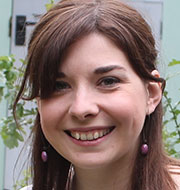 Leaving the Risky Business event I was abuzz with enthusiasm to “choose my attitude,” “listen to the right people,” and treat patient safety “like lives depend on it.” However, it was not all buzzwords, tweeting, and chatting with celebrity speakers. It was a packed day, with lots of emotive content and key messages to change the current approach to healthcare.
Leaving the Risky Business event I was abuzz with enthusiasm to “choose my attitude,” “listen to the right people,” and treat patient safety “like lives depend on it.” However, it was not all buzzwords, tweeting, and chatting with celebrity speakers. It was a packed day, with lots of emotive content and key messages to change the current approach to healthcare.
Debra Searle’s description of her 3300 mile solo quest across the Atlantic, and her determination to survive to see her family, was inspirational. She was able to skilfully link her approach on that journey to the daily motivation needed to fulfil tasks and highlight how empowering choosing the right attitude can be.
Clare Bowen and Martin Bromiley each shared very personal experiences in the hope of improving training for healthcare staff who communicate with families after bereavement, especially where things have gone wrong. Clare Bowen’s daughter underwent a planned splenectomy and died from complications after the team utilised a novel piece of equipment. Clare explained how in the following months, the full details of what happened were not disclosed. Her simple plea was to understand what had happened to her daughter, and to communicate with the team that had looked after Beth in “joint grief.”
Martin Bromiley appreciated the ITU team’s efforts for his wife, who also died unexpectedly after routine surgery, but found what he regarded to be a lack of kindness in the written and verbal communication with the team after her death. The silence during both talks was poignant .
There was a change of pace as we heard of innovative concepts being used to improve health internationally. Stephen Muething, from Cincinnati Children’s Hospital, discussed how “safety is personal,” and described how he’d championed the rollout of a patient safety initiative across the United States. He criticised healthcare for being too accepting of risk and too slow to respond. He appealed that we should “Be humble, ask others, ‘what are you doing?’ Be gracious and share what you are doing.”
In the spirit of sharing, Fiona Godlee chaired a panel discussion with five leaders of industry to glean tips for effective leadership. Most topically, Fiona Dalton (chief executive of Southampton Hospital) reflected briefly on Southampton Trust’s approach to very public difficulties in the last few weeks. She was humble, citing her most important role to be “connecting clever people with difficult problems.” Cressida Dick (assistant commissioner of the Metropolitan Police) explained the ongoing responsibility that leaders have to their team in a crisis situation; and the importance of enduring support for staff even after high profile headlines have faded. The panel agreed that building resilience in an increasingly high visibility culture with social media was a key skill—certainly something the NHS needs to be increasingly familiar with.
When asked why there was a perceived lack of listening from NHS managers, Gary Copeland (managing director for British Airways) asserted that no leader would be unwilling to hear what their team have to say, and challenged that engagement from those within the team affects the culture as much as the leadership itself. It is clear that attitude is valued as much as aptitude, so take that as encouragement to speak up about issues, but be ready with some potential solutions too.
John Vincent, of food chain Leon and the headmaster of Charlton Manor School, did just that when attempting to meet the government’s pledge to implement universal free meals for years one to three in infant school. He explained how they worked with an initiative and not against it, despite the scale and challenges. They used the opportunity of free meals to improve the school’s kitchen facilities, which now not only provide nutritious meals but also lessons for cookery, parent-children food awareness sessions, and a small business opportunity for the young entrepreneurs of the school.
Similarly, Lieutenant Colonel Tania Cubison gave an enlightening talk about the insurmountable practicalities of running Camp Bastion’s trauma unit. She described, with some humour, the need to run trauma calls “like a Formula One pit stop,” and how they cope with an ever changing rotation of staff by investing in proper training—something that can be difficult to prioritise in a time of austerity.
A personal highlight was hearing the experience of Ben McBean, a young Marine who stepped on a landmine in 2008. To have him cajole the audience, saying “on your bad days have a little hope”—while calling himself lucky as he “just lost two limbs,” compared to his friends who have suffered post-traumatic stress disorder—was humbling. His positivity and motivation to show what he is still able to do was infectious. A real lesson in perspective and how to appreciate what is working well when challenges build up.
Despite the challenge of making the NHS fit for the future, there is hope if we all take responsibility for the culture, manage patient concerns with compassion, and choose to face change with the right attitude. I choose to be optimistic.
Emma Parish is editorial registrar, The BMJ.
I have read and understood BMJ policy on declaration of interests and declare the following interests: None.
